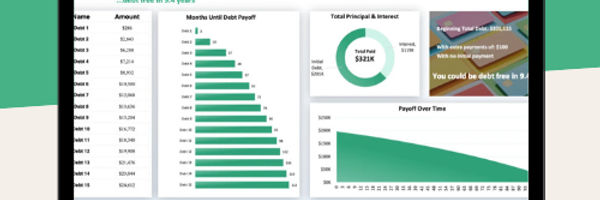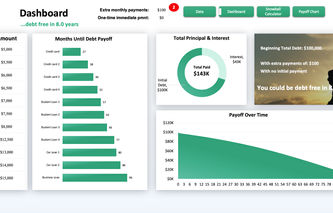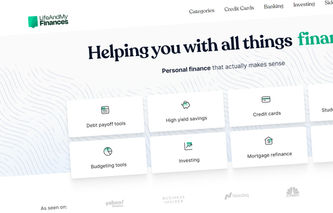Most people take it at face value. You whip out your credit card, swipe, and collect your goods. Done.
But most people will also run into problems with paying back the money they’ve just spent… because they won’t know how credit cards really work. Not you—
This article will show you:
How credit cards work (in simple terms)
What goes on behind the scenes when you’re using your credit card
How different types of credit cards vary in how they work
How to make a credit card work for you
To understand how a credit card works, you need to understand what a credit card is—
What Is a Credit Card?
A credit card is a plastic card, issued by a bank, a store, or another financial institution. It is a payment method that allows you to purchase goods and services and sometimes withdraw cash. It is also essentially a loan.
Typically, when you apply for a credit card (and get approved), you sign up for a revolving credit account. Revolving credit is a type of loan that gets automatically renewed every time you pay it back.
Your financial institution then grants you a credit limit, the maximum amount of money you can borrow from them.
A credit card is a piece of plastic that proves that you’ve secured a loan. When you use it, you’re spending someone else’s money—unlike when you use your debit card.
More articles on credit cards:
What Is a Good APR for a Credit Card (What Annual Percentage Rates are Low, Average, and High)
How Many Credit Cards Should I Have? The Good and the Bad of Owning Multiple Cards
80+ Credit Card Statistics: Must-Known Fact About Credit Cards
The differences between credit cards and debit cards
At first glance, credit cards and debit cards are carbon—or rather plastic—copies of one another. Using both will feel very similar: you’ll swipe them, read in their chip, or key in your personal information online. But what happens behind the scenes is quite different.
Your debit card is connected to your checking account. As soon as the transaction goes through, the money will be withdrawn from your account. You can only spend what you have. You spend it all, and, well, you’re broke, but no one will go after you (well, not until you start missing your payments and bills anyway).
When you use your credit card, you are borrowing money from a financial institution. If you’ve gone all out like in the example above, you can still use your credit card. As with any loan, credit cards accrue interest if you miss payments. (And, if you max out your credit card and not pay it back, banks and card companies will go after you.)
The three key differences between credit cards and debit cards:
When you use a debit card, you’re using your own money. If you use a credit card, you’re using someone else’s.
Debit cards do not affect your credit score, credit cards do.
Credit cards provide additional fraud protection under the Fair Credit Billing Act (FCBA).
How Do Credit Cards Actually Work?
Here’s a real-life example:
You’ve got a shiny new credit card—it shows that you have an opening balance of $0 and a credit limit of $1,000. You currently owe nothing to your credit card issuer and can borrow up to a thousand dollars.
Next, you head to the supermarket and use your card to pay $150 for your weekly groceries. Your current balance is now $150 (what you owe your bank), while your available balance is $1,000 – $150 = $850 (the amount you can spend until you reach your credit limit).
And that’s how a credit card works: nothing came out of your bank account, but you owe the funds before the end of your monthly billing period. If you don’t pay the full amount, you’ll be charged interest.
How do credit card payments work? Understanding your billing cycle
Your credit card operates on a billing cycle (generally 28 to 31 days), at the end of which you receive a statement by mail and/or online. Your statement breaks down everything you need to know about your credit card this month: all the transactions for this billing period, your balance, your current APR, and the minimum payment due. Beware, the minimum payment is the amount you must pay by the due date to remain in good standing. Your statement will be delivered to you no later than 21 days before said due date, according to the regulations of the CARD Act.
Your bill is typically due on the same day each month. If you pay your balance in full, you are on the right track and will avoid any and all interest charges. Thankfully, banks often include a grace period—an interval between the end of your billing cycle and the due date of your payment, during which you are not building interest.
If you don’t want to waste money on the “F” word (that’s fee, stop giggling):
review your statement monthly
cover more than your minimum payment
ideally, pay your bill in full.

Lay out your credit card debt with the minimum payments and interest to see how long it will take to pay off!
What you will get:
Interactive dashboard
Customizable to your needs
Stay on track with charts and graphs
Suitable for up to 16 or 32 debts!

What You Need to Know About Your Card
How a credit card works is more complicated than simply keeping tabs on what you spend and pay back. The whole process involves interest rates, fees, and charges:
What is APR?
APR stands for Annual Percentage Rate, and it’s the yearly interest rate on your credit card debt. Financial institutions charge interest on your current balance—the amount remaining after the payment due date. When comparing credit cards, this is the most obvious factor to consider. The lower the interest rate, the better.
The average APR across all credit cards in the US is 16.27%, according to the Federal Reserve System’s report from November 7, 2022.
Many people don’t realize this, but credit card APR is not a fixed value. It can rise and fall over time, depending on your payment history, your FICO score, and the federal prime rate (a foundation rate for all loans in the US). If the prime rate suddenly goes up, so does your APR. As per the CARD Act, credit card companies are obligated to inform you about the increase in your interest rate at least 45 days ahead of time.
Note that there are multiple APRs that come into play depending on the type of transaction and other factors. Your APR is more of a range than a single fixed number. The common types of APRs are:
Introductory APR
Some credit cards offer a lower—often as low as 0%—promotional APR when you first open your account. It’s the lowest APR you can get. Just remember that it’s likely a limited offer. When the offer ends, the introductory APR will go up and become purchase APR.
Purchase APR
This is the APR we automatically think about when discussing credit cards. Naturally, it applies to all new purchases made with your card. Your credit card provider determines the initial value.
Balance transfer APR
This type of APR applies when you move an existing balance from one credit card to another. It’s usually higher than purchase APR.
Cash advance APR
The rate charged for borrowing cash with your credit card. A much higher APR than regular.
Penalty APR
If you violate your agreement by missing payments or being late with them, your APR will gradually increase. It might even reach an unthinkable 29.9% after 60 days, legally, the highest APR.
How is your interest calculated?
Despite APR being an annual rate, your credit card provider likely calculates your interest on a daily basis, using a DPR (Daily Periodic Rate).
To calculate your [monthly] interest:
Divide your APR by the number of days in the current year. That’s your DPR.
Multiply your DPR by your average daily balance. That’s your average daily interest.
Multiply the result by the number of days in your billing cycle.
Suppose that your balance is $1,000, and your APR is 20%. Thus, your average daily interest will be: (20% / 365) * $1,000 = $0.55 per day. In a month, your balance will go from $1,000 to $1,016.5. This is a simplified explanation, of course.
The tricky part is that most banks calculate your interest with compounding. You are paying interest on your interest! If you carry over your balance month after month, your debt will grow faster than you think.
Charges and fees (and how to avoid them)
Your interest is not the only factor you should keep in mind when learning to be responsible with your finances. Credit cards come with a price. The price is multiple charges and fees you accumulate over time and reckless behavior. The types of credit card fees are:
Annual (and monthly maintenance) fee
Some credit cards charge a yearly or monthly fee just for the privilege of carrying a card. The only way to avoid this fee is to select a card without it.
Late payment fee
You will be charged a late fee if the lender does not receive your minimum payment before its due date. Making the minimum payment early is a healthy financial habit to pick up. Don’t procrastinate until the last minute.
Interest charges
A fee charged as interest, as discussed above. You will be able to avoid these charges completely if you pay your balance in full every month.
Balance transfer fee
A fee for transferring your balance from one credit card to another. As a rule, this fee is often between 3% and 5% of the amount you move. If you have excellent credit, you may be able to secure a credit card with a 0% balance transfer fee.
Cash advance fee
A fee similar to the balance transfer down to the percentages, only charged for withdrawing cash. The bullet-proof strategy to avoid this charge is to stay away from cash advances altogether.
Over-limit fee
You risk facing this fee when you exceed your credit limit. But only if you opt in to the fee first. Otherwise, your transactions over the limit will be rejected. Do not opt in to over-the-limit fee, and refrain from maxing out your credit card if you can help it.
Cash advances: are they a good idea? (No!)
Whether you are getting your nails done or paying off urgent medical bills, you might need cash ASAP. If there is an ATM nearby, it might be tempting to withdraw cash using your credit card. Most credit card companies are eager to provide you with this option, known as cash advance. Should you take it?
Cash advances are costly. The APR is much higher than the standard. Your bank will charge you a transaction fee plus an ATM fee if you used one, and there is no grace period before you begin accruing interest. Additionally, you can’t withdraw money equal to your entire line of credit. Cash advances are capped at a fraction of your credit limit, usually at a couple of hundred dollars.
A cash withdrawal from the ATM isn’t the only form of a cash advance!
The following are generally considered cash advances:
Buying lottery tickets
Sending money via a wire transfer
Purchasing traveler’s checks
Getting gaming chips
Placing bets
Paying off bail bonds
Use cash advances only under extreme circumstances.
For mid-term and long-term scenarios, consider cheaper options, like personal loans, instead.

Lay out your credit card debt with the minimum payments and interest to see how long it will take to pay off!
What you will get:
Interactive dashboard
Customizable to your needs
Stay on track with charts and graphs
Suitable for up to 16 or 32 debts!

Types of Credit Cards to Consider
Not all credit cards are created equal. Different types of credit cards have their own quirks when it comes to the way they work. If you are wondering what credit card is right for you, look no further.
Secured cards
For the most part, standard credit cards are unsecured. You don’t have to put down a cash deposit to open your credit account. However, if you are a new borrower or returning to the world of credit after a former financial fiasco (i.e., you have to repair your credit ASAP), you might not qualify for an unsecured credit card. That’s when secured credit cards come in.
As you sign up for a secured card, you will supply a security deposit that will become your credit limit. The credit limits are low, and the fees are high, but secured credit cards are the fastest way to (re)build your credit.
We recommend OpenSky® Secured Visa® Credit Card if you are just dipping your toes into credit.
Student cards
If you have no credit history, but you are a college student, you are in luck! No need to worry about security deposits, you can apply for another category of the so-called starter credit cards. Student credit cards are specifically designed for students (duh!) and don’t charge annual fees or demand cash upfront. They even offer rewards like cash back.
Introductory 0% APR cards
A 0% APR card offers no interest for a limited, “introductory” period of time (usually from six to 21 months). The 0% APR in question refers to purchase APR and balance transfer APR, but does not affect any other transactions. This card is perfect for consolidating your debt via a balance transfer. Just keep in mind that the introductory period is going to end, and your balance after that point will accrue interest.
Rewards cards
For every dollar you spend, rewards credit cards offer you cash back, points, or travel miles, which you can redeem in the future. Cash back cards and travel credit cards are the two most popular types of rewards credit cards. Overall, these cards encourage you to spend money on everyday activities and pay your balance in full by the end of the billing period. Your rewards can be redeemed as gift cards, travel perks, and statement credit.
Read more:
The Pros and Cons of Using a Credit Card
Now that you know the ins and outs of credit cards, you can make an informed decision whether owning a credit card is right for you.
Why you should get a credit card?
Reasons to sign up for a credit card:
Earn rewards
Depending on your card type, you can earn various rewards for using your credit card normally. Everyday expenses can add up quickly and return to you as cash back, loyalty points, or airline miles. The more you spend, the more you redeem! Sign-up bonuses and introductory 0% APR can be lucrative benefits as well.
Stay safe
Credit cards are far more secure than debit cards or cash. They offer extra protection from fraud and identity theft under federal law. You don’t have to worry about your card getting lost or stolen, or that expensive online purchase never making it to your door.
Enjoy the convenience
Credit cards are so easy to use! No need to carry cash with you everywhere. No need to carry your credit card, either. Setting up your digital wallet allows you to pay with your phone or computer without presenting a card (Apple Pay, Google Pay, and Venmo are a good place to start). Internet banking is another convenient feature. With one click, you can check your statement online and see the breakdown of every single transaction.
Build credit
Using your credit card is one of the easiest and fastest ways to build credit—provided you are paying off your balance each month. And good credit opens the door to a higher quality of life: you can more easily get a home loan, rent a car, get cheaper insurance, and even land your dream job (some employers pull a credit report of sorts before hiring).
What are the disadvantages of credit cards?
When you’ve mastered credit card dos and don’ts and committed to being a financially responsible person, owning a credit card is a no-brainer. If not though, using a credit card might be a bad idea.
Basically, you are always at risk of treating your credit card as your own money. And it simply is not. Do not overextend yourself, as getting into debt is much quicker and easier, than digging yourself out of it.
You already know about the gigantic list of potential fees and charges you might pay. Not to mention the skyrocketing APR if you decide to use your credit card for cash advances or skip payments. Credit cards are not cheap, especially when the interest is high.
Boosting your credit with a credit card is the plan, but if you miss payments, it can hurt your credit instead. It’s a double-edged sword, you see. A useful tool for the financially responsible, yet a disaster in the making if you tend to overspend or are prone to tardiness.
FAQ
How do you pay off a credit card?
How do credit cards affect your credit score?
Can you pay off your credit card with another credit card?
How long does a credit card refund take?
How does tipping with a credit card work?
Can you put money on a credit card?
SOURCES
Can I withdraw money from my credit card at an ATM? (2022, September 22). Consumer Financial Protection Bureau. https://www.consumerfinance.gov/ask-cfpb/when-i-tried-to-use-my-credit-card-to-get-cash-from-an-atm-i-could-not-do-so-even-though-i-know-i-have-not-used-all-my-credit-what-can-i-do-en-34/
How are FICO Scores Calculated? | myFICO. (n.d.). Retrieved March 17, 2023, from https://www.myfico.com/credit-education/whats-in-your-credit-score
How Long Does a Credit Card Refund Take? - Experian. (n.d.). Retrieved March 17, 2023, from https://www.experian.com/blogs/ask-experian/how-long-does-a-credit-card-refund-take/
The Fed—Consumer Credit—G.19. (n.d.). Retrieved March 17, 2023, from https://www.federalreserve.gov/releases/g19/current/
Using Credit Cards and Disputing Charges | Consumer Advice. (n.d.). Retrieved March 17, 2023, from https://consumer.ftc.gov/articles/using-credit-cards-and-disputing-charges
What Is APR & How Does It Work? | Capital One. (n.d.). Retrieved March 17, 2023, from https://www.capitalone.com/learn-grow/money-management/what-is-apr/
Credit Card Accountability Responsibility and Disclosure Act of 2009. (2009). http://uscode.house.gov/statutes/pl/111/24.pdf

.jpg)



